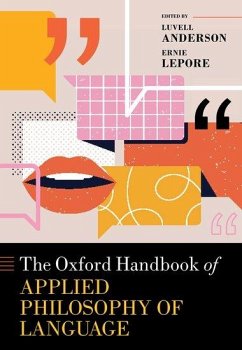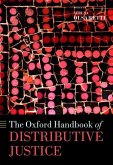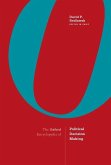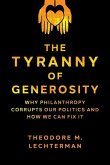The Oxford Handbook of Applied Philosophy of Language
Herausgeber: Anderson, Luvell; Lepore, Ernie
The Oxford Handbook of Applied Philosophy of Language
Herausgeber: Anderson, Luvell; Lepore, Ernie
- Gebundenes Buch
- Merkliste
- Auf die Merkliste
- Bewerten Bewerten
- Teilen
- Produkt teilen
- Produkterinnerung
- Produkterinnerung
This Handbook represents a collective exploration of the emerging field of applied philosophy of language, where philosophy engages with linguistic aspects of our social world. It explores such hot topics as dehumanizing speech, dogwhistles, taboo language, pornography, appropriation, implicit bias, speech acts, and the ethics of communication.
Andere Kunden interessierten sich auch für
![The Oxford Handbook of Population Ethics The Oxford Handbook of Population Ethics]() The Oxford Handbook of Population Ethics217,99 €
The Oxford Handbook of Population Ethics217,99 €![The Oxford Handbook of Distributive Justice The Oxford Handbook of Distributive Justice]() The Oxford Handbook of Distributive Justice228,99 €
The Oxford Handbook of Distributive Justice228,99 €![Oxford Studies in Philosophy of Language Volume 2 Oxford Studies in Philosophy of Language Volume 2]() Oxford Studies in Philosophy of Language Volume 2112,99 €
Oxford Studies in Philosophy of Language Volume 2112,99 €![Oxford Studies in Political Philosophy Volume 4 Oxford Studies in Political Philosophy Volume 4]() Oxford Studies in Political Philosophy Volume 4143,99 €
Oxford Studies in Political Philosophy Volume 4143,99 €![The Oxford Encyclopedia of Political Decision Making The Oxford Encyclopedia of Political Decision Making]() The Oxford Encyclopedia of Political Decision Making476,99 €
The Oxford Encyclopedia of Political Decision Making476,99 €![Reincarnation and Karma, a Spiritual Philosophy Applied to the World Today Reincarnation and Karma, a Spiritual Philosophy Applied to the World Today]() Reincarnation and Karma, a Spiritual Philosophy Applied to the World Today35,99 €
Reincarnation and Karma, a Spiritual Philosophy Applied to the World Today35,99 €![The Tyranny of Generosity The Tyranny of Generosity]() Theodore M LechtermanThe Tyranny of Generosity46,99 €
Theodore M LechtermanThe Tyranny of Generosity46,99 €-
-
-
This Handbook represents a collective exploration of the emerging field of applied philosophy of language, where philosophy engages with linguistic aspects of our social world. It explores such hot topics as dehumanizing speech, dogwhistles, taboo language, pornography, appropriation, implicit bias, speech acts, and the ethics of communication.
Hinweis: Dieser Artikel kann nur an eine deutsche Lieferadresse ausgeliefert werden.
Hinweis: Dieser Artikel kann nur an eine deutsche Lieferadresse ausgeliefert werden.
Produktdetails
- Produktdetails
- Verlag: Hurst & Co.
- Seitenzahl: 720
- Erscheinungstermin: 24. September 2024
- Englisch
- Abmessung: 251mm x 188mm x 66mm
- Gewicht: 1429g
- ISBN-13: 9780192844118
- ISBN-10: 0192844113
- Artikelnr.: 68506265
- Herstellerkennzeichnung
- Libri GmbH
- Europaallee 1
- 36244 Bad Hersfeld
- gpsr@libri.de
- Verlag: Hurst & Co.
- Seitenzahl: 720
- Erscheinungstermin: 24. September 2024
- Englisch
- Abmessung: 251mm x 188mm x 66mm
- Gewicht: 1429g
- ISBN-13: 9780192844118
- ISBN-10: 0192844113
- Artikelnr.: 68506265
- Herstellerkennzeichnung
- Libri GmbH
- Europaallee 1
- 36244 Bad Hersfeld
- gpsr@libri.de
Luvell Anderson is Associate Professor of Philosophy and Affiliate Faculty in African American Studies and Women's and Gender Studies at Syracuse University. Before coming to Syracuse, he was an assistant professor of philosophy at the University of Memphis and Alain Locke Postdoctoral Fellow at Pennsylvania State University. His research lies principally in Philosophy of Language, Philosophy of Humor, and Philosophy of Race. He has published articles on the semantics of racial slurs and racist humor, and is co-editor of the Routledge Companion to the Philosophy of Race (Routledge Press). Professor Anderson is currently working on a book, The Ethics of Racial Humor, which explores themes of race, humor, and the connection between ethics and aesthetics. Ernie Lepore is Board of Governors Professor of Philosophy at Rutgers University. He has authored numerous books and papers in the philosophy of language, philosophical logic, metaphysics and philosophy of mind, including recently Imagination and Convention (with Matthew Stone, OUP, 2015), and Liberating Content (2016) with Herman Cappelen. He is the co-editor of The Oxford Handbook of Contemporary Philosophy of Language (with Una Stojnic, 2024) and of the series Oxford Studies in Philosophy of Language, with David Sosa.
* 1: Luvell Anderson and Ernie Lepore: Introduction
* 2: Sally Haslanger and Stephen Yablo: Amelioration as Course
Correction
* 3: Ángeles Eraña and Axel Barceló: A world where many worlds fit
* 4: J. L. Dowell: Silencing and Assertion: An Account of their
Conversational Dynamic
* 5: Quill R. Kukla: The Pragmatics of Technologically Mediated Online
Speech: Don't @ Me!
* 6: Robin Jeshion: The Truth About Slurs
* 7: Una Stojni¿ and Ernie Lepore: Slurring Words
* 8: Rebecca Roache: On Passive Aggression
* 9: Timothy Jay: Taboo Word Research: Problems from the Past, Plans
for the Future
* 10: Louise Antony: Speech-Act Theory in Feminist Thought
* 11: Mari Mikkola: Pornography as Oppressive Speech
* 12: Cameron Domenico Kirk-Giannini and Michael Glanzberg: Pronouns
and Gender
* 13: E. M. Hernandez and Archie Crowley: How to Do Things with
Gendered Words
* 14: Iz González Vázquez, Martina Rosola, and Anna Klieber: Beyond
Pronouns: Gender Visibility and Neutrality across Languages
* 15: Anita L. Allen: Privacy, Critical Definition and Racial Justice
* 16: Jules Holroyd and Matthew J. Cull: Gender-neutrality and family
leave policies
* 17: Esa Saarinen: In Praise of Spoken Philosophy
* 18: Teresa Blankmeyer Burke: Boxed Ears and Swiveling Fists: American
Sign Language, Audism, and Power
* 19: Luvell Anderson: Resistance and Reclamation: Notorious Thugs
* 20: José Medina: Public Protest and Silencing
* 21: Jeffrey King: The Contents of Maps
* 22: Gabriel Greenberg: Map Semantics and the Geography of Meaning
* 23: John Kulvicki: The Semantics of Iconography and Code Words
* 24: Ray Drainville and Jennifer Saul: Visual and Linguistic
Dogwhistles
* 25: erman Cappelen and Josh Dever: AI with Alien Content and Alien
Metasemantics H
* 26: Daian Flórez: Semantic Change in the Language of Technology
* 27: Eliot Michaelson, Jessica Pepp, and Rachel Sterken: On Retweeting
* 28: Matthew McKeever: Ideology and Intersectionality
* 29: Tina Chanter and Andrew Cutrofello: Shakespeare's Proper Names
* 30: Noël Carroll: Art and Language
* 2: Sally Haslanger and Stephen Yablo: Amelioration as Course
Correction
* 3: Ángeles Eraña and Axel Barceló: A world where many worlds fit
* 4: J. L. Dowell: Silencing and Assertion: An Account of their
Conversational Dynamic
* 5: Quill R. Kukla: The Pragmatics of Technologically Mediated Online
Speech: Don't @ Me!
* 6: Robin Jeshion: The Truth About Slurs
* 7: Una Stojni¿ and Ernie Lepore: Slurring Words
* 8: Rebecca Roache: On Passive Aggression
* 9: Timothy Jay: Taboo Word Research: Problems from the Past, Plans
for the Future
* 10: Louise Antony: Speech-Act Theory in Feminist Thought
* 11: Mari Mikkola: Pornography as Oppressive Speech
* 12: Cameron Domenico Kirk-Giannini and Michael Glanzberg: Pronouns
and Gender
* 13: E. M. Hernandez and Archie Crowley: How to Do Things with
Gendered Words
* 14: Iz González Vázquez, Martina Rosola, and Anna Klieber: Beyond
Pronouns: Gender Visibility and Neutrality across Languages
* 15: Anita L. Allen: Privacy, Critical Definition and Racial Justice
* 16: Jules Holroyd and Matthew J. Cull: Gender-neutrality and family
leave policies
* 17: Esa Saarinen: In Praise of Spoken Philosophy
* 18: Teresa Blankmeyer Burke: Boxed Ears and Swiveling Fists: American
Sign Language, Audism, and Power
* 19: Luvell Anderson: Resistance and Reclamation: Notorious Thugs
* 20: José Medina: Public Protest and Silencing
* 21: Jeffrey King: The Contents of Maps
* 22: Gabriel Greenberg: Map Semantics and the Geography of Meaning
* 23: John Kulvicki: The Semantics of Iconography and Code Words
* 24: Ray Drainville and Jennifer Saul: Visual and Linguistic
Dogwhistles
* 25: erman Cappelen and Josh Dever: AI with Alien Content and Alien
Metasemantics H
* 26: Daian Flórez: Semantic Change in the Language of Technology
* 27: Eliot Michaelson, Jessica Pepp, and Rachel Sterken: On Retweeting
* 28: Matthew McKeever: Ideology and Intersectionality
* 29: Tina Chanter and Andrew Cutrofello: Shakespeare's Proper Names
* 30: Noël Carroll: Art and Language
* 1: Luvell Anderson and Ernie Lepore: Introduction
* 2: Sally Haslanger and Stephen Yablo: Amelioration as Course
Correction
* 3: Ángeles Eraña and Axel Barceló: A world where many worlds fit
* 4: J. L. Dowell: Silencing and Assertion: An Account of their
Conversational Dynamic
* 5: Quill R. Kukla: The Pragmatics of Technologically Mediated Online
Speech: Don't @ Me!
* 6: Robin Jeshion: The Truth About Slurs
* 7: Una Stojni¿ and Ernie Lepore: Slurring Words
* 8: Rebecca Roache: On Passive Aggression
* 9: Timothy Jay: Taboo Word Research: Problems from the Past, Plans
for the Future
* 10: Louise Antony: Speech-Act Theory in Feminist Thought
* 11: Mari Mikkola: Pornography as Oppressive Speech
* 12: Cameron Domenico Kirk-Giannini and Michael Glanzberg: Pronouns
and Gender
* 13: E. M. Hernandez and Archie Crowley: How to Do Things with
Gendered Words
* 14: Iz González Vázquez, Martina Rosola, and Anna Klieber: Beyond
Pronouns: Gender Visibility and Neutrality across Languages
* 15: Anita L. Allen: Privacy, Critical Definition and Racial Justice
* 16: Jules Holroyd and Matthew J. Cull: Gender-neutrality and family
leave policies
* 17: Esa Saarinen: In Praise of Spoken Philosophy
* 18: Teresa Blankmeyer Burke: Boxed Ears and Swiveling Fists: American
Sign Language, Audism, and Power
* 19: Luvell Anderson: Resistance and Reclamation: Notorious Thugs
* 20: José Medina: Public Protest and Silencing
* 21: Jeffrey King: The Contents of Maps
* 22: Gabriel Greenberg: Map Semantics and the Geography of Meaning
* 23: John Kulvicki: The Semantics of Iconography and Code Words
* 24: Ray Drainville and Jennifer Saul: Visual and Linguistic
Dogwhistles
* 25: erman Cappelen and Josh Dever: AI with Alien Content and Alien
Metasemantics H
* 26: Daian Flórez: Semantic Change in the Language of Technology
* 27: Eliot Michaelson, Jessica Pepp, and Rachel Sterken: On Retweeting
* 28: Matthew McKeever: Ideology and Intersectionality
* 29: Tina Chanter and Andrew Cutrofello: Shakespeare's Proper Names
* 30: Noël Carroll: Art and Language
* 2: Sally Haslanger and Stephen Yablo: Amelioration as Course
Correction
* 3: Ángeles Eraña and Axel Barceló: A world where many worlds fit
* 4: J. L. Dowell: Silencing and Assertion: An Account of their
Conversational Dynamic
* 5: Quill R. Kukla: The Pragmatics of Technologically Mediated Online
Speech: Don't @ Me!
* 6: Robin Jeshion: The Truth About Slurs
* 7: Una Stojni¿ and Ernie Lepore: Slurring Words
* 8: Rebecca Roache: On Passive Aggression
* 9: Timothy Jay: Taboo Word Research: Problems from the Past, Plans
for the Future
* 10: Louise Antony: Speech-Act Theory in Feminist Thought
* 11: Mari Mikkola: Pornography as Oppressive Speech
* 12: Cameron Domenico Kirk-Giannini and Michael Glanzberg: Pronouns
and Gender
* 13: E. M. Hernandez and Archie Crowley: How to Do Things with
Gendered Words
* 14: Iz González Vázquez, Martina Rosola, and Anna Klieber: Beyond
Pronouns: Gender Visibility and Neutrality across Languages
* 15: Anita L. Allen: Privacy, Critical Definition and Racial Justice
* 16: Jules Holroyd and Matthew J. Cull: Gender-neutrality and family
leave policies
* 17: Esa Saarinen: In Praise of Spoken Philosophy
* 18: Teresa Blankmeyer Burke: Boxed Ears and Swiveling Fists: American
Sign Language, Audism, and Power
* 19: Luvell Anderson: Resistance and Reclamation: Notorious Thugs
* 20: José Medina: Public Protest and Silencing
* 21: Jeffrey King: The Contents of Maps
* 22: Gabriel Greenberg: Map Semantics and the Geography of Meaning
* 23: John Kulvicki: The Semantics of Iconography and Code Words
* 24: Ray Drainville and Jennifer Saul: Visual and Linguistic
Dogwhistles
* 25: erman Cappelen and Josh Dever: AI with Alien Content and Alien
Metasemantics H
* 26: Daian Flórez: Semantic Change in the Language of Technology
* 27: Eliot Michaelson, Jessica Pepp, and Rachel Sterken: On Retweeting
* 28: Matthew McKeever: Ideology and Intersectionality
* 29: Tina Chanter and Andrew Cutrofello: Shakespeare's Proper Names
* 30: Noël Carroll: Art and Language








